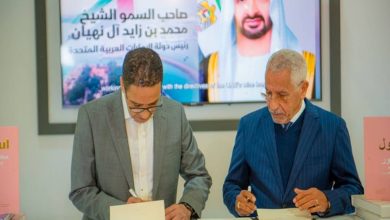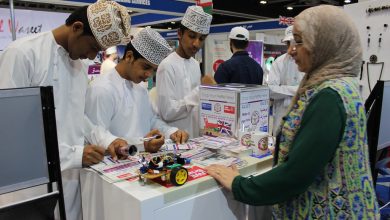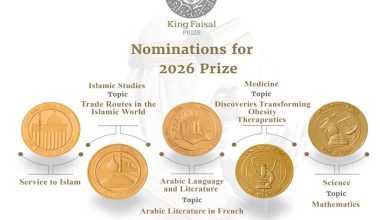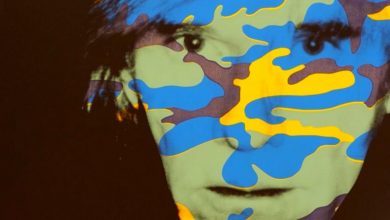King Faisal Prize for Service to Islam recognizes a pioneering Islamic organization the “Japan Muslim Association”, renowned for its historic translation of the Holy Quran into Japanese, and the esteemed intellectual Mr. Mohammed El Sammak.
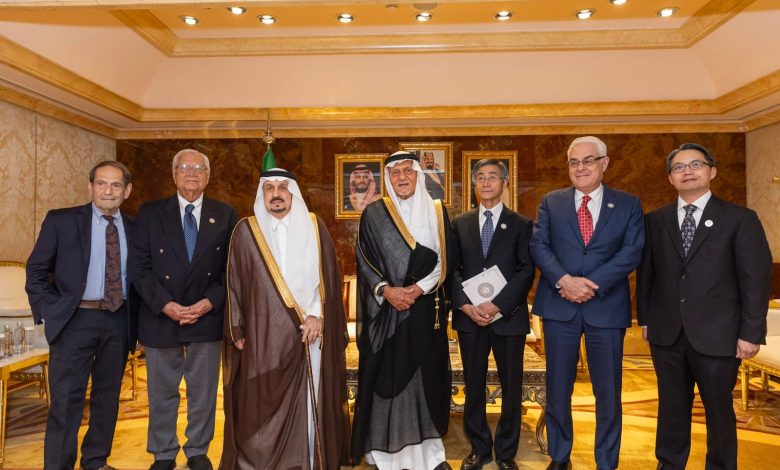
Under the auspices of the Custodian of the Two Holy Mosques King Salman bin Abdulaziz and in the presence of His Royal Highness Prince Faisal bin Bandar bin Abdulaziz, Governor of Riyadh region, King Faisal Prize honored today its laureates for this year 2024.
King Faisal Prize for Service to Islam this year was distinguished by the honoring of the first Islamic organization for Muslims in Japan, “Japan Muslim Association” in appreciation of its diligent efforts in serving Islam and Muslims and in promoting understanding and tolerance in Japanese society. The Association was founded in 1952 under the name of “Society of Muslim Friends” and worked to serve and attend for Muslims in Japan, defend their interests, and pay special attention to educating Muslim youth to enable them to understand their religion and culture. In 1957, the
Association launched the scholarship program sending students to Islamic countries for education and academic achievement. In 1961, it established the “Muslim Students in Japan Association”. To defy the misconceptions about Islam, the Association published books and publications explaining the true Islamic values and principles and issued the “Voice of Islam” bulletin in 1959. In 1963, the Association established the “Association of Islamic Studies in Japan.” The efforts of the Association were not limited to Japan alone, but also included organizing Hajj and Umrah for Japanese Muslims. The president of the ” Japan Muslim Association,” Yahya Toshio Endo, said in his speech during the ceremony: “Throughout the history of the association, many achievements have been made, thank Allah, most notably the project of the first translation of the Holy Quran into Japanese language by Muslims. It was translated by the second president of the Association, Omar Meta – May his soul rest in peace – and published in 1972. A number of books of Quranic interpretation, hadiths, and the biography of the Prophet were also translated in addition to writing, translating, and distributing many introductory materials about Islam.”
King Faisal Prize for Service to Islam was also awarded to the prominent intellectual Mr. Mohammed El Sammak, a pioneer in dialogue and bridge-building between different faiths, who has made a lasting impact in interfaith dialogue over five decades. He is awarded for his effective contributions to conferences exploring Islam’s relationship with other beliefs and his leadership in institutions dedicated to tolerance and peace. Mr. El Sammak’s efforts in promoting Islamic-Christian dialogue resulted in direct meetings between the Grand Imam of Al-Azhar and His Holiness the Pope of the Catholic Church in the Vatican, as well as between His Excellency the President and Secretary-General of the Muslim World League in Makkah and the Pope of the Vatican and the dignitaries of the Catholic Church in Rome. These meetings produced documents, the most prominent of which was the “Human Fraternity” document issued in Abu Dhabi in 2019. Mr. El Sammak studied political science, media, and Islamic thought, and obtained an honorary doctorate in humanities from the Lebanese American University. He currently holds the position of Secretary-General of the National Committee for Christian-Muslim Dialogue in Lebanon, as well as the position of Secretary-General of the Permanent Secretariat of the Islamic Spiritual Summit in Lebanon. He also served as an advisor to the late Lebanese Prime Minister Rafik Hariri.
Mr. Mohammed El Sammak has other contributions as a political thinker and writer in prominent Arab newspapers such as (Al-Ahram – Cairo) and (Al-Ittihad – Abu Dhabi), and has several works on Islam, politics, and Islamic-Christian dialogue, including: “Introduction to the Islamic-Christian Dialogue,” “The Position of Islam in the Clash of Civilizations,” and “Muslims and Contemporary Challenges.” He received many awards and honors, including the “The Fondazione Ducci” Peace Award in Italy, the Italian Order of Merit of the Republic Officer’s rank, and the King Hussein Award for Distinguished Giving of the First Class, among others. In his speech during the ceremony, Mr. Mohammed El Sammak said: “Islam champions the dignity of man in view of his human nature. Islam also recognizes existing differences among people… Thanks to His wisdom, Allah wants to make people different, but He calls upon us to seek to know each other. In this sense, dialogue is both the path and the instrument.” He also mentioned Pope John Paul II’s respect for his religious beliefs during the Synod on Lebanon in 1993, where the meeting coincided with Friday prayers, so Mr. El Sammak apologized for attending. He quoted the Pope as saying during the conference, “We hope Mohammed El Sammak, our guest and partner in the dialogue, will pray for the success of this Synod.” El Sammak added that when the Pope invited him to his personal table with a small group of cardinals, he insisted that only water and orange juice be served, out of respect for his Islamic faith.
In the field of Islamic Studies, which focused this year on “Islamic Legislations and their Contemporary Applications” the prize was awarded to Professor Wael Hallaq; the Avalon Foundation Professor in the Humanities at Columbia University since 2009, teaching ethics, law, and political thought. Professor Wael Hallaq, among the top 500 scholars in Islamic Studies globally, was awarded the Islamic Studies prize for his groundbreaking contributions in guiding the development of Islamic legislation. His doctoral work challenging the narrative of “the closing of the gate of ijtihad” gained prominence, reshaping accepted paradigms in the field.
He obtained his master’s and doctoral degrees from the University of Washington in 1979 and 1983 in Islamic jurisprudence and law, respectively. In 1985, he joined McGill University in Canada as an assistant professor of Islamic law. In 1994, he became a full professor, and named a James McGill Professor in Islamic Law in 2005. Professor Hallaq has produced many pioneering research papers and books, addressing various topics ranging from the emergence of Islam to our modern history. Among his distinguished works are: “The Impossible State” and “Reforming Modernity: Ethics and the New Human in the Philosophy of Taha Abdurrahman,” and “The Origins and Evolution of Islamic Law.” His intellectual works in the field of Islamic studies have shaped Western academic education on Islamic law, and his books and articles have been translated into more than 10 languages, including Japanese, Indonesian, Italian, Russian, German, Albanian, and others. The scientific efforts of Professor Wael Hallaq have been crowned with numerous awards, including his book “The Impossible State” winning the Columbia’s distinguished Book Award in 2015 for two consecutive years. In 2020, he won the Nautilus Book Award for his book “Reforming Modernity.” Then, in 2021, he received the TÜBA Prize awarded by the Turkish Academy of Science, in appreciation of his innovative and pioneering ideas and contributions to the field of humanities and social sciences. Later that same year, he was elected as an honorary member of this academy. In his acceptance speech during the ceremony he said, “Without talent and inspiration, also inexplicable, we have no hope of intellectual and artistic achievement, and so I am extremely grateful for whatever I have been endowed with, and for any hand that lent me help. I never take any of these for granted.”
King Faisal Prize for Arabic Language & Literature for 2024 on the topic of “Non-Arab Institutions and their Endeavors to Promote Arabic” was withheld due to nominated works not elevating to the criteria of the prize.
This year’s medicine prize topic is “Management of Peripheral Disabilities”. Professor Jerry Mendell, Director of Gene Therapy Center at Nationwide Children’s Hospital, received the prize for his pioneering work in the screening, early diagnosis, and treatment of patients with spinal muscular atrophy (SMA), Duchenne muscular dystrophy, and limb girdle muscular dystrophies. He was the first investigator to demonstrate the safety and efficacy of high doses of AAV-mediated gene transfer therapy in patients with SMA type 1, a treatment that is globally approved. He demonstrated that it takes courage, commitment, and determination to translate preclinical developments for the benefit of patients. In his acceptance speech, he said, “The principles of the award that reflect King Faisal’s intent to relieve human suffering are consistent with my own views and lifetime achievements. I have done everything I could do to improve the quality and prolong life for patients afflicted with neuromuscular diseases.”
As for the Prize in Science, it was awarded to Professor Howard Chang, a professor at Stanford University in the United States, Professor Howard Yuan-Hao Chang is awarded the prize for his pioneering contributions in elucidating the role of long non-coding RNAs in gene regulation and function, overturning the previous belief that 98% of human DNA is non-functional. Professor Chang co-developed innovative genome-wide approaches for identifying DNA regulatory regions. These discoveries are having a powerful impact across molecular biology and genetics and have important implications for understanding complex human diseases. In his acceptance speech during the ceremony, Professor Chang said, “Our research asked a basic question: how do cells decide when and where to switch different genes on? How do these decisions get passed over time? Our studies led us to a new class of RNAs, called long noncoding RNAs, that help cells remember their cell fates. Our understanding of the gene switches led to an understanding of how inherited genetic differences cause disease, especially immune diseases. This understanding also helped to tackle mutations that arise in cancer.”
Since 1979, King Faisal Prize in its 5 different categories has awarded 295 laureates who have made distinguished contributions to different sciences and causes. Each prize laureate is endowed with USD 200 thousand (SAR 750,000); a 24-carat gold medal weighing 200 grams, and a Certificate inscribed with the Laureate’s name and a summary of their work which qualified them for the prize.



